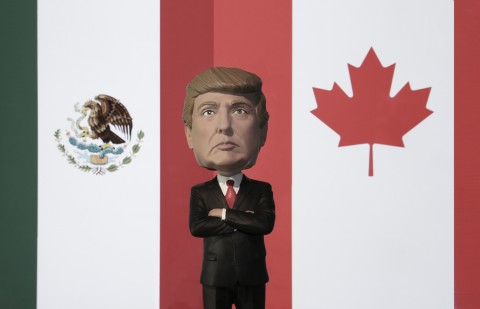
CARTT.CA HAS MENTIONED EFFORTS by many in the cultural and media sectors to support the federal government’s effort to maintain the cultural exemption as part of a renegotiated NAFTA – and now we’ve taken a look at letters by Quebec members of The Coalition for Culture and Media supporting the Trudeau’s government efforts to preserve a global cultural exemption in this and any future trade agreement.
Three reasons explain the timing of this campaign:
- Certain clauses in the proposed agreement between Mexico and the U.S. relating to electronic commerce if applied to Canada could be detrimental.
- The sudden emergence of the cultural exemption as sticking point in the negotiations, according to mainstream media speculation.
- The sense (hope?) that the federal government is getting close to a deal – and the fear is that in the last seconds of negotiations Canada would ease up on the cultural side to preserve milk quotas, for example, despite reassurances from the Prime Minister.
According to the Fédération nationale des communications, (FNC) a union representing workers in the communications field, rumours that the Canadian government is trying to extend the global cultural exemption that would apply to all chapters of the Agreement is hopeful news. They fully agree with that but the FNC is concerned by the fact that the CETA (the Comprehensive Economic Trade Agreement with Europe) and the proposed TPP (Trans-Pacific Partnership) were a departure from Canadian tradition by having reserves in certain chapters of the agreement instead of a full global exemption.
While the cultural groups know the U.S. wants concessions on cultural issues mostly having to do with electronic commerce as illustrated by the recent agreement with Mexico, such clauses would prevent Canadian efforts to force foreign American platforms such as Netflix to contribute to Canadian content production. It would also prevent Canadian efforts to ensure those platforms’ algorithms favour Canadian products for Canadian customers.
As Le Front des réalisateurs independent du Canada (FRIC) mentioned in its letter, not having the capacity to impose measures to force big Americans companies to support the creation of Canadian content could jeopardize existing quality Canadian content.
Others such as the Associations Québécoise de la production médiatique (AQPM) fear compromises in terms of Canadian ownership of broadcasting or telecommunications.
“We have accepted American content with enthusiasm and paid handsomely for the privilege. At the same time, always keeping room for the development, production, and distribution of Canadian content. That fight has never been easy, and it never ends.” – QEPC
Quebec English-language Production Council (QEPC) for its part mentions: “We have accepted American content with enthusiasm and paid handsomely for the privilege. At the same time, always keeping room for the development, production, and distribution of Canadian content. That fight has never been easy, and it never ends.”
The Alliance Québec Animation (AQA) concludes its letter by saying the strength of the sector depends on the talent of its creators but also on the laws institution and financing that have built it and keep protecting it.
Also worth mentioning, Friends of Canadian Broadcasting and Unifor, also members of The Coalition for Culture and Media have launched a media campaign with full-page ads in the Globe and Mail and Le Devoir. There has been little officially and publicly released from other English-language Canadian cultural groups on the same level as the Quebec groups.
NAFTA negotiations are ongoing and so many deadlines have been given and not met that it is impossible to give any sense of timing on a new deal.
Some key dates:
- US midterm elections – 6 November;
- Swearing in of the new Mexican president (elected in July) – 1 December 2018 and
- Federal election in Canada—21 October 2019



